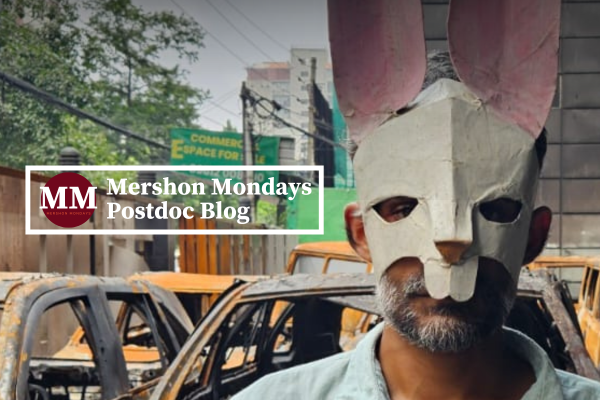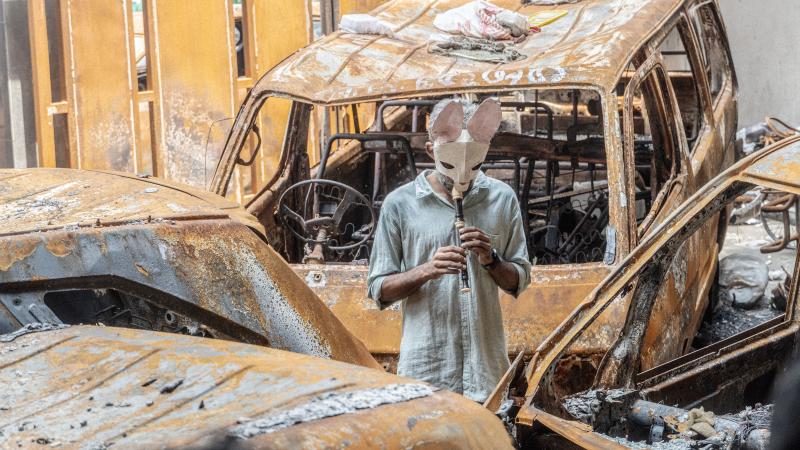Postdoc Blog: I Remember a Place Called Dhaka

On our Mershon Monday event on September 30, we had the pleasure of hearing Rasel Ahmed speak about his ongoing project, I Remember a Place Called Dhaka, which was recently awarded a grant from the Greater Columbus Arts Council. Professor Ahmed is Assistant Professor of Theatre, Film, and Media Arts, whose filmmaking explores topics such as state violence, queer displacement and forced migration.
I Remember a Place Called Dhaka is a collaborative film project between Professor Ahmed and over 30 team members based in Bangladesh. Ahmed has been politically exiled from Bangladesh due to his involvement with the local queer community and has not been able to return to his country since 2016. His filmmaking thus addresses the challenges of being unable to use Bangladesh as a filming location, and how he uses experimental cinematic techniques to transgress the legal boundaries of citizenship and border.
For I Remember a Place Called Dhaka, Ahmed introduces a concept he refers to as Disembodied Filmmaking. This approach specifically tackles the restriction of movement faced by exiled or displaced filmmakers and involves developing innovative techniques that mitigate the need for physical presence during the filmmaking process. For this project, Ahmed’s team uses live transmission technology that provides him with a comprehensive view of what the Director of Photography is capturing on-camera in Bangladesh. Ahmed is also collaborating with a performer based in Dhaka who is playing Ahmed in the film. Ahmed described this as a technique which both draws attention to and transgresses the structural constraints engendered by forced migration.

These methods foreground the complexity of how places are embodied. In creating the film, Ahmed not only reflects on his memories of Dhaka but also actively engages with the city's current landscape, making new memories in the process. For example, he shared how, in the aftermath of the recent Bangladeshi student-led uprising in the summer of 2024, graffiti became a popular practice for expressing political demands. In this context, his production team wrote the text of an archival gay love letter on a wall in Dhaka; the letter had been found among the possessions of one of Ahmed’s friends who had been murdered in 2016. The production team filmed the performance of making this graffiti. But this action sparked a chain reaction, even after the scene had been filmed. A few days later, the film’s producer, while passing the wall, discovered that someone had crossed out the two male names and replaced one with a female name. In the talk, Ahmed reflected that, despite his forced exile from Dhaka, his filmmaking establishes a new relationship to the city without his physical presence.
Professor Ahmed also spoke about the potential of filmmaking to subvert dominant narratives attached to Refugee Cinemas. Ahmed explained how frequently refugee cinema is associated with seemingly ‘simple’ filming techniques, such as content filmed with a mobile phone. Moreover, as many of these films are made by individuals who are not refugees themselves, they posit the refugee as the subject, rather than the agent in a purportedly objective narrative designed to elicit empathy. In contrast, by employing complex technologies and, through blurring the lines between imagination and reality, I Remember a Place Called Dhaka presents an implicit contestation of these narratives.
The possibilities of technology to shift narratives around refugee experiences and queer displacement is a common thread through Ahmed’s activism as an archivist. He mentioned his involvement in an archive he co-founded, Queer Archives of the Bengal Delta (QABD). As part of an archiving project initiated by QABD, Ahmed’s work utilizes photogrammetry to archive the residence of a local queer activist. Ultimately, Ahmed intends to transform this project into a virtual reality experience for Bangladeshi queers who once organized in that house but are unable to visit Bangladesh due to their refugee or asylum status. This allows Ahmed to combine traditional archival material, such as letters and photographs, with personal objects and artifacts to foreground queer lived experiences and histories against erasure, marginalization and violence.
Image: A still from I Remember A Place Called Dhaka (Dir: Rasel Ahmed, Producer: Arifur Rahman, Director Of Photography: Manzur Anik).
Mershon Monday Story by Postdoctoral Scholar Helen Murphey, in collaboration with colleagues Julia Marino and Nicholas Nyachega.
